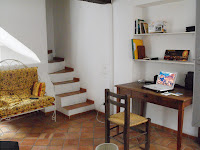I find it curious how certain fields of work simply run through certain family’s veins. Even in this modern age where it is not necessarily a matter of survival, we are often still tied to the fields of work most practiced in the family, even subconsciously. I find that this is especially true with teachers. Ask any teacher and they can most likely name at least one member of their immediate family that spent their life in the same field. From a very young age, I was surrounded by teachers in my personal life—my family members and consequently most of their friends—and spend a great deal of time listening to all the nuances of the métier. I grew up rejecting the idea of picking up the family practice of struggling with administration and dealing with estranged parents, all for the greater good of a child that is often oblivious of the circus revolving around him. I always saw the passion trough the tears, but ultimately it was the tears that made the greater impression. I promised myself that I would save the world in some other way—perhaps one more unique to myself and forcibly more exotic. What I failed to truly notice, or rather, acknowledge, was the fact that it is in my blood, and thus a talent with which I am endowed, and whether or not I prefer to admit it, I have been making use of it all along. In all the positions of leadership I was privileged to have held, it was the teaching aspect I most enjoyed.
Funny thing… when I originally wrote this, I had a typo for “leadership” and instead wrote “learnership.” I believe this Freudian slip speaks greatly to the true nature of teaching: the never-ending cycle of learning. When teaching someone something new, it is imperative to adapt to his or her style of learning and to sculpt the material to fit with his or her interests. This forces the teacher to be constantly thinking in new creative and innovative ways; it demands a certain openness and flexibility, often times unperceivable which is why often times we only remember the very best and worst teachers, and perhaps remember more of those whom we disliked. Personally, in my memory, the teachers were those that were seldom boring because they used the book for the information but not necessarily for the exercise. They kept my interests because they themselves were interested. They not only helped me to better comprehend that material with which I was working, but also opened my eyes to greater possibilities, wider points of view, and more complex understandings.
I believe that the greatest moments in the field of education are those of connection. That is to say that we make connections in academically, emotionally, and emotionally about academics. This takes some explanation (We are speaking solely of those moments that transpire in the field of education):
Emotional—When a child of 6 years old says his first words to his mother who otherwise thought he would never have the capacity for speech. The connection: teacher-student, student-parent, parent-teacher.
Academic—When writers block lifts from the heavy fogs of library dust and all idea suddenly collide to create a perfectly complex concept where all elements work together. The connection: teacher-student, student-ideas, ideas-concept-more advanced intellect.
Emotionally Academic—When a student is able to connect multiple elements of subject matter taught in numerous different classes, as well as adding personal observations about his or her own personal understandings of life, and finds that there is a very powerful common thread running through all these studies. The students may be a historical period apart from the material with which he/she is working, but they find themselves to be a continuation, in a sense, of its original movement. The connection: research-ideas/concept, concept-students approach to life and learning, student’s approach-new ideas, new ideas-new research… the cycle continues. One of my students recently used the phrase and concept of “drawing a parallel” between the material and one’s own life, and I was stunned. Not only had she realized the importance of comprehension and retention of the material, but also she was able to touch upon a key concept in the very basics of education that is all too often overlooked. When we “draw a parallel” between ourselves and our academic focus, it becomes personal; it becomes something we retain and carry for the rest of our lives. The best teachers are those that can unearth this for and with their students and inspire them to continue this approach in other aspects of their lives. For me, I have always taken great pride in knowing that I was able to help someone learn something new—even if it was a single word—and I always cherish my relationships based on what I have learned from others.
I currently feel a bit overwhelmed by all the information I am absorbing on a daily basis, but in my time with the students, I feel strangely at ease and natural, as though the possibilities are endless. They are blank canvases waiting to be painted with new discoveries and I am looking forward to helping them chose their colors.

 A taste of Lorgue's colorful personality and charm
A taste of Lorgue's colorful personality and charm One of my favorite sights to behold. I suppose I love its simple aethetic appeal.
One of my favorite sights to behold. I suppose I love its simple aethetic appeal. A taste of Lorgue's colorful personality and charm
A taste of Lorgue's colorful personality and charm One of my favorite sights to behold. I suppose I love its simple aethetic appeal.
One of my favorite sights to behold. I suppose I love its simple aethetic appeal.

















